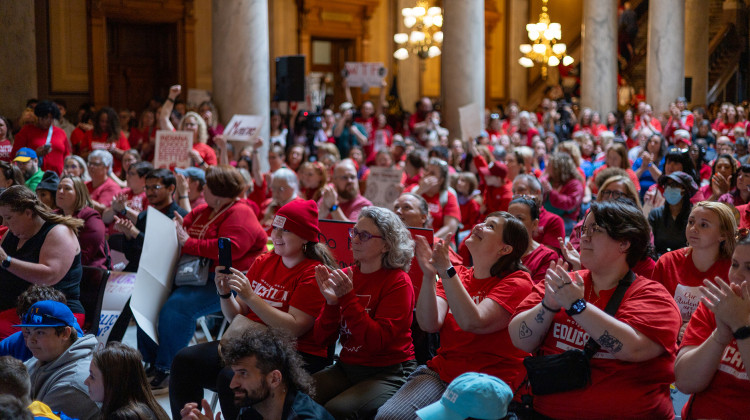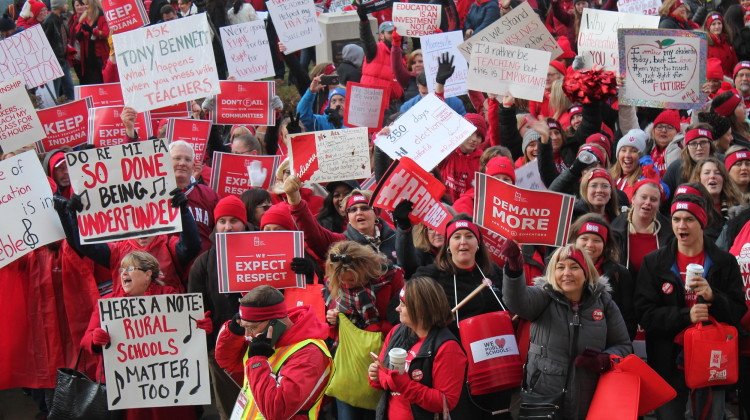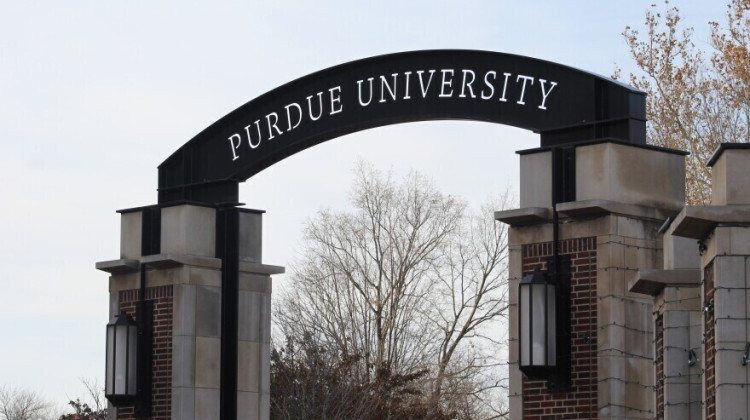Purdue University is bringing the author of “Unsettled: What Climate Science Tells Us, What it Doesn’t and Why it Matters” -- a recently published book criticizing how climate reports are communicated to the public -- to campus Tuesday, as part of the fall Presidential Lecture Series.
The book’s author, Dr. Steven Koonin, has been widely criticized for his views -- namely, that the media, politicians, and scientists alike overhype and misrepresent the data associated with climate issues and unprecedented weather events.
And some community members and university faculty worry about what Koonin’s visit says about Purdue’s position on climate change. (Purdue’s Presidential Lecture series is a financial supporter of WBAA.)
Koonin, currently a New York University professor, served as an undersecretary for science in the U.S. Department of Energy under the Obama administration. He was a chief scientist at major oil corporation BP. More recently, he became a senior fellow with the American Enterprise Institute -- a right-wing think tank.
Last week, Purdue President Mitch Daniels penned an op-ed in the Washington Post praising Koonin as someone “daring to challenge a prevailing orthodoxy.”
Daniels’s op-ed stopped short of endorsing Koonin’s contrarian climate views, noting that they might be “completely wrong,” but underlined that his book has revealed a “burn the heretic attitude that has infected too much of the academic and policy worlds.”
In an interview with WBAA, Koonin -- a theoretical physicist -- claimed that climate scientists either do not understand the science or are deliberately misleading the public.
“Some scientists truly believe the earth is in peril,” he said. “That’s not what is said by the reports. Other scientists it’s money, prominence -- different motivations for different constituencies.”
The Intergovernmental Panel on Climate Change is a body of the United Nations that compiles and assesses all the available science on climate change for use in developing climate policies. The panel's sixth report, released in August, was described by U.N. Secretary-General António Guterres as “code red for humanity.”
Koonin said he does not disagree with the IPCC reports -- but he takes issue with how the findings are summarized and explained to the public.
As an example, Koonin pointed to a summary line from the report --“human-induced climate change is already affecting many weather and climate extremes in every region across the globe”-- and emphasized that the body of the report is more nuanced.
The IPCC report finds it “very likely” that human activity has increased the intensity and frequency of hot extremes, and has “high confidence” that human influence has contributed to intensified precipitation across North America, Europe, and Asia. But the IPCC only expresses “low confidence” that human influence has affected meteorological droughts.
When Koonin reads these varied findings, he concludes that “it’s hard to say that the weather is broken.”
Koonin takes this a step further in his book, arguing that human impact is “too uncertain (and very likely too small) compared to the daunting amount of change required to achieve the goal of eliminating net global emissions by, say, 2075.”
This contrasts starkly with IPCC findings that underscore “unequivocal” human influence and “unprecedented” levels of change.
Climate scientists and economists say Koonin’s objections rehash what amounts to 20-year old climate denial.
Andrew Dressler is a professor of atmospheric sciences at Texas A&M University.
“As far as that specific question, which is -- do the high level conclusions match the back material? -- this is an argument that is at least 20 years old,” he said. “The Bush administration convened a national academy panel to look at that question, and they said ‘yeah, the top line matches the bottom line.’ If they didn’t, you’d see a lot of scientists speaking out about it.”
“Scientists write the report,” Dressler said. “If they saw the summary for policymakers misrepresented, it would be a big deal. None of the experts who actually write the report agree with Koonin. He has an opinion, he’s welcome to it, but realize that’s an opinion no one else shares.”
And, Dressler said, anyone arguing that the science is too uncertain isn’t arguing from a legitimate position.
“It’s cherry picked data, it’s things that are misrepresented mixed in with conspiracy theories,” he said. “He’s a climate flat earther.”
Dressler questions why Koonin’s work is being elevated at all, receiving write-ups in the Washington Post and Wall Street Journal, but believes Koonin’s brand of climate denial is ultimately on its way out.
“I don’t see that these are the kinds of arguments that get traction with the broad public anymore,” he said. “Most people, they look out their window and they can see climate change is real. Given the fact that what’s happening is exactly what was predicted by scientists decades ago. I think that people understand that climate science is real, as described by the scientific community.”
Gernot Wagner is a climate economist with NYU and one of the signatories on a piece in Scientific American that calls Koonin’s conclusions “scientifically empty.” He said Koonin’s arguments run counter to science and logic.
“Look, we know enough to act,” Wagner said. “We know enough to know that the stuff we can quantify, the stuff we can translate into dollars and cents is bad enough, it points in one and only one direction.”
“The unsettling thing is when a scientist comes along and says there are uncertainties and therefore we shouldn’t act -- it goes counter to everything I know,” he said. “When you see risk, you manage, you mitigate … the only proper response is to say there are lots and lots of risks out there -- let’s mitigate those risks!”
Community members have broader concerns about Koonin’s invitation to campus, and what it might indicate about Purdue’s stance on climate change.
Shannon Kang, a Purdue student and West Lafayette city council member, said she was frustrated by the university’s decision to invite Koonin.
“We’re an education institution, so they are not trying to be partisan,” she said. “But this is an issue you cannot deny. It’s so blatantly obvious, and it really stresses me out and pisses me off when we invite people like that to our campus.”
Kang said it’s hard not to read the invitation as one that undermines the work done by the Purdue Climate Change Research Center.
“A research institution that has a world-class climate research institution here at Purdue, it’s like a slap in the face,” Kang said. “I would love to hear what those people who are researching climate at Purdue are thinking right now.”
Purdue officials did not respond to requests for comment on this story. Multiple scientists outside of Purdue also declined to be interviewed -- some cited exasperation with Koonin, and others said they didn’t want to give space to disinformation.
“I support engaging many perspectives for debate and discussion that is grounded in a factually complete and accurate landscape,” one scientist wrote. “For example, debating about the use of free market solutions or regulation for climate action. I do not condone giving a public space for sharing misinformation.”
Jeff Dukes is the director of the Purdue Climate Change Research Center.
“On issues like this, when we’re trying to make important plans about the future, and plans that set signals for our up-and-coming generation about what the future is going to look like, we need leadership,” he said. “It’s clear, at Purdue, the leader is very much our president, Mitch Daniels. It’s clear that Mitch Daniels does not have climate change as a high priority on his list.”
But Dukes said that could still change.
“His indifference on the issue of climate change has been deafening, and that really shows on issues like this,” he said. “If he chose one morning to get up and decide to push this university into a future where we were going to be a leader on this issue statewide and nationally, that could happen within weeks.”
 DONATE
DONATE







 Support WFYI. We can't do it without you.
Support WFYI. We can't do it without you.